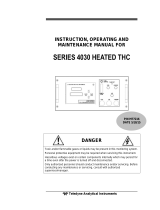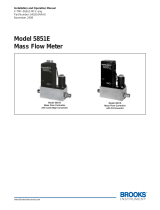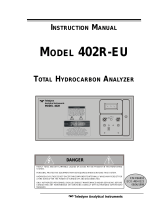Page is loading ...



STORING
-40ºC +80ºC
INSTALLATION
1. Dimensions in mm
114
102
121
102
54
Bleed vent
Exhaust vents
2. Requirements
Do not block side vents
IMPORTANT
To conform with the Health and Safety at Work Act 1974 our product should be
installed, used and maintained in accordance with:
1 Normal Safety Procedures
2 The installation and operating instructions provide for each instrument.
3 BS 6379 for general applications or ANSI/ASA-57.3 1975
4 BS 5345 for hazardous area applications
Note: Pictures shown as block diagrams: not to scale or diagrammatically
Protection IP65 in
operating conditions
-40ºC +80ºC
Recalibration Required

INSTALLATION (continued)
3. Fixing
a Mounting Bracket
2 screws
b Pipe Mounting Kit (option)
(i) Remove screws
(ii) Remove bracket
(iii) screw in new bracket
(iv) clamp to pipe
Ø 50mm nominal
(v) Tighten nuts
4. Mounting Dimensions

7. Expose Terminals
Cable ø 6 to 8
mm
8. Insert Cable
6. Remove Connector
9. Assemble and Fit Connector
a
b
c
d
e
f
5. Make Pneumatic Connections
Soft sealing anaerobic
hydraulic seal
E.g. Loctite hydraulic seal
512
E.g. 6mm (1/4”) nylon
pipe
1/4" NPT OR BSP
View Looking at Pins of Instrument
1
2
3
+ve
Earth
-ve
10. Air Supply
BS 6739: 1986
Dust < 5 micron
Oil: < 1ppm mass
Pressure: 1 bar > P2
Dewpoint at least 10ºC below
minimum anticipated ambient
temperature
Suitable I/P Converter Up to 6 I/P Converters
Particle /Water
Removal Filter
Type F72G with 5 micron
Element
Type F74G with 5 micron
Element
Oil/Particle/
Water Removal
Filter
Type F72C F74C
Regulator Type R72 Type R74
Combination
Filter/Regulator
Type B72 with 5 micron
Element (=F72+R72)
Type B74 with 5 micron
Element

11. Calibration
When the instrument is first installed , or after a long period of downtime, a moderate zero shift is normal. This is due
to the rubber diaphragms which are stretched by the internal springs. After a few operations, the instrument will
settle into its normal operating condition. It is recommended that, under these circumstances, instruments should be
exercised by alternately applying zero and full scale signals several times. Zero calibration should then be carried
out.
Air Supply
Minimum signal
Adjust zero control (anti-clockwise) to
give minimum required output pressure
+ to Maximum Signal
Adjust range control (anti-clockwise on 2-wire, clockwise on 3
wire) to give maximum required output pressure
Note: Reverse Acting Operation
1 About 20 turns of the zero screw may
be required to reset the zero point.
2 3-wire instruments require to be factory
set for reverse action.
3 Reverse action is not currently
available on high pressure models
4 Do not over wind nozzle to prevent
jamming
a.
b.
c.

Parts Breakdown
Care must also be taken to re-align transfer passages correctly during reassembly of the instrument.
Routine maintenance consists of replacing the restrictor screw if the internal orifice becomes blocked.
12. Maintenance

14. Troubleshooting Guide
Problem Posssible Causes Suggested Action
No Output Pressure Reversed Current polarity or
faulty connections
Broken internal wiring
No air supply
Check wiring and signal
continuity with milliameter
Check instrument resistance with
ohmmeter. Repair if faulty.
Correct
Maximum output not available Insufficient supply pressure
Damaged coil or nozzle
Oil contamination
Clogged restrictor
Adjust
Return to Factory for Repair
Replace instrument
Replace
Zero will not adjust Worm disengaged with pinion
(after excessive adjustment)
Re-engage components
Zero calibration error on initial
turn-on
A small error is normal Exercise instrument several times
and retest
13. Product Variations
E-P Versions (Voltage Controlled converters)
These are available in the 2 and 3 wire versions. The two wire versions are recalibrated I/P convert-
ers with a suitable buffer resistor in series with the coil to adjust the sensitivity
3 Wire Versions
These are products designed for electrical control signals which differ from the normal 4-20. 0-
60mA signals. An internal amplifier is fitted to translate the control signal into the required current
through the coil. An external 12V-24V DC signal is required to power the amplifier, which should be
capable of providing 25mA (low pressure) or 65mA. (high pressure)
It is essential that wiring be carried out correctly as incorrect wiring may destroy the amplifier
completely.
Control
1
2
3
+
12V –24V
Supply
Common
Captured Exhaust Versions: Designed for use with certain gases. This part must be connected to
a suitable exhaust arrangement e.g. stack pipe. N.B. Check before installation.
Warning: Not for use where no escape of gas is permitted to escape to the environment due to the
constant bleed of the unit
Materials of Construction:
Lid: Nylon 66; Magnet: Permanent Neodymium Iron Boron; Magnet Ironwork: Zinc plated mild steel
Flapper: Beryllium Copper; Nozzle: Brass
1
2
3
+
Control
Common
3 Wire
2 Wire


M-1438/09/02
/


